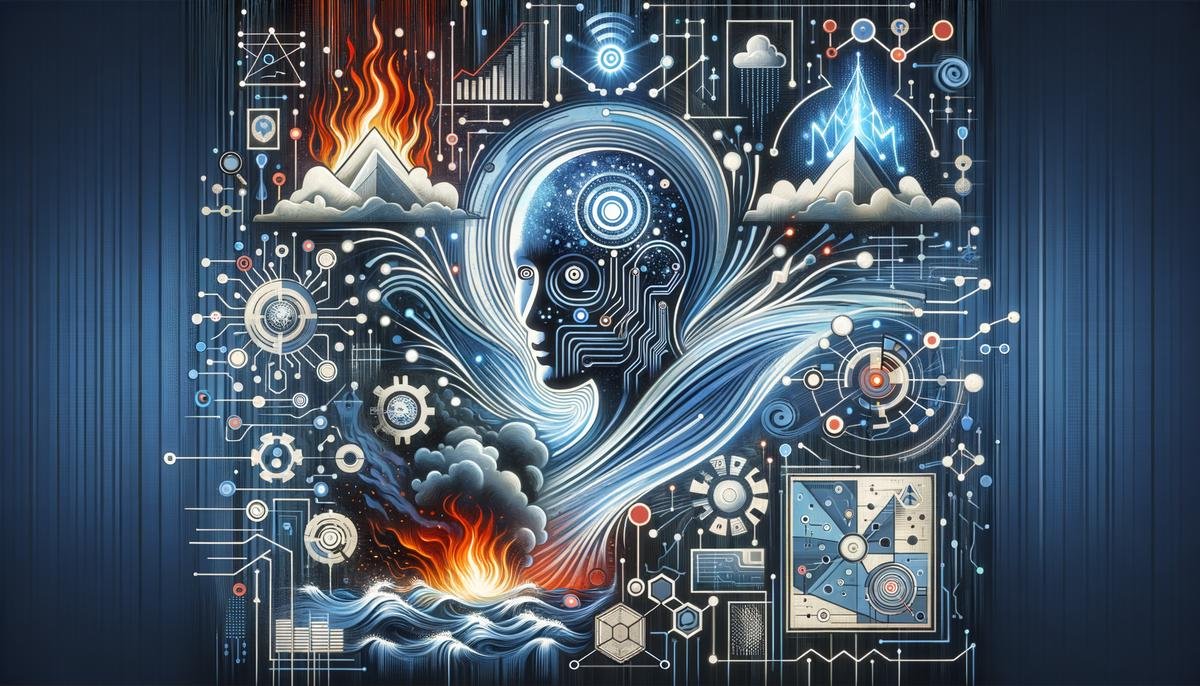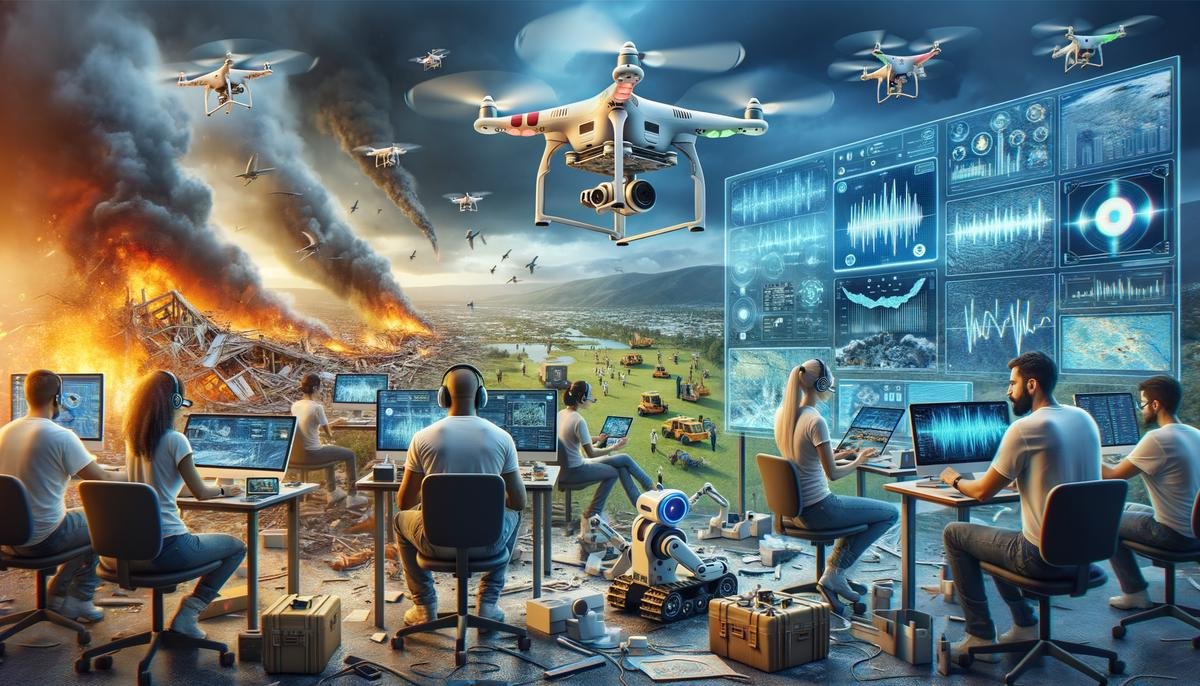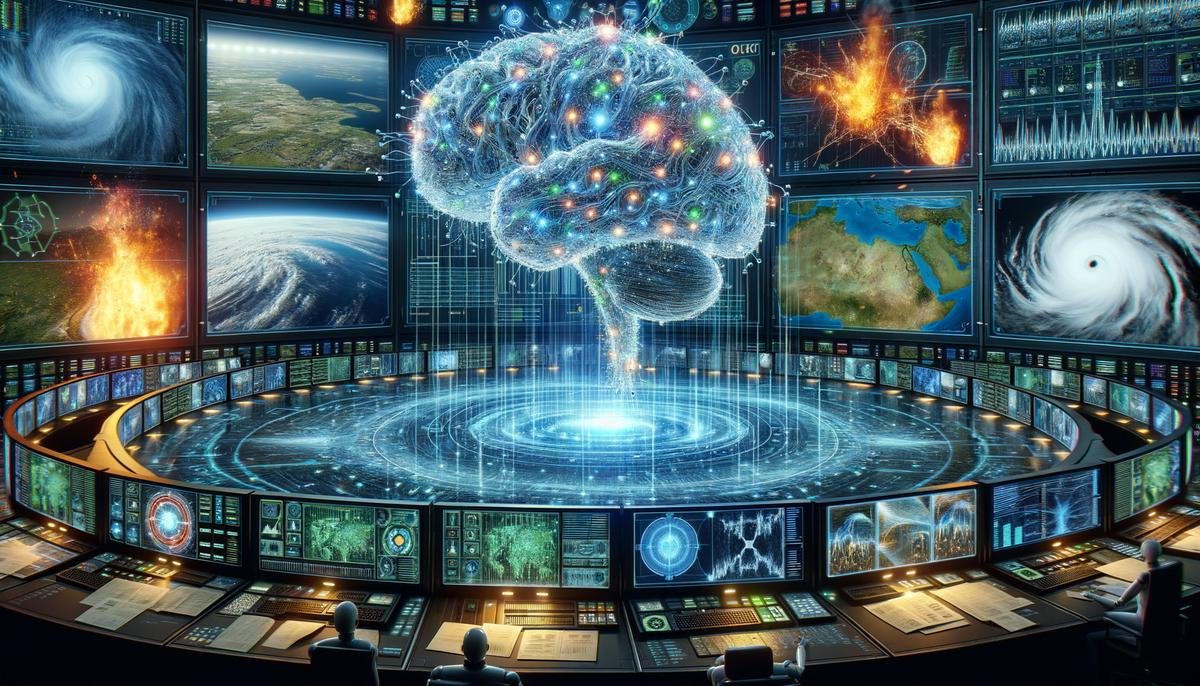Understanding AI and Its Capabilities in Crisis Situations
Harnessing the Power of AI in Crisis Management
In an ever-evolving world, the unexpected can hit at any moment, transforming a routine day into a scene of crisis. From natural disasters to pandemics, the stakes have never been higher. But here’s the game-changer: Artificial Intelligence (AI). It’s like having a superhero sidekick, swooping in to manage crises in ways we never thought possible. So, what makes AI indispensable in handling emergencies? Let’s dive in.
AI: The Crisis WhispererImagine you’re facing a hurricane. Old school methods have you glued to the TV, hoping for updates. Enter AI, a game-changer that monitors weather patterns in real-time, predicts the hurricane’s path, and even sends alerts to your phone about when to evacuate. This isn’t science fiction; it’s AI revolutionizing crisis management.
Lights, AI, Action: Instant Decision-Making
Decisions during crises are typically time-sensitive. AI excels here, making lightning-fast decisions based on data analysis. While we’re still pondering our options, AI has already mapped out the best evacuation routes, located the nearest shelters, and even figured out which areas need urgent aid. It’s like having a decision-making wizard at your fingertips, ensuring help arrives where it’s needed most, pronto.
- The Oracle of Predictions
One of AI’s standout features is its ability to predict future crises before they happen. Through analyzing vast amounts of data, AI can spot patterns and warn us about potential wildfires, disease outbreaks, or even economic downturns. This predictive power is a game-changer, allowing us to brace ourselves and mitigate the impact of looming crises.
Communication: AI’s SuperpowerIn a crisis, misinformation can spread faster than wildfire. AI cuts through the noise, providing accurate, reliable information straight to your device. It can tailor information to specific locations and needs, making sure everyone gets the message they need, when they need it. Plus, AI chatbots can handle thousands of inquiries simultaneously, ensuring no one is left in the dark.
Resource Allocation: AI Knows BestWhen disaster strikes, resources like food, water, and medical supplies are in high demand. AI steps into the breach, analyzing needs and logistics to optimize distribution. No more guesswork; AI ensures essentials get to those in desperate need efficiently and effectively.
Training for the UnexpectedAI isn’t just about managing crises; it’s also about learning from them. Through simulations and data analysis, AI helps us prepare for future emergencies, training responders with scenarios that mimic real-life crises. It’s like having a rehearsal for the main event, ensuring we’re ready when disaster strikes.
In a Nutshell
From predicting and preventing crises to managing them with unprecedented efficiency, AI has become an indispensable tool in our crisis management arsenal. It’s not just about technology; it’s about harnessing the power of AI to save lives, protect communities, and emerge stronger from adversities. As we continue to face global challenges, AI stands as a beacon of hope, guiding us through storms and ensuring we’re never fighting alone. The future of crisis management is here, and it’s powered by AI.

Case Studies: AI’s Role in Specific Emergency Situations
AI Revolutionizing Disaster Response and Relief Efforts
In today’s fast-paced world, artificial intelligence (AI) isn’t just about robots taking over jobs or making science fiction a reality. It’s stepping up as a heroic force in disaster response and relief efforts, making a tangible difference when every second counts. Here, we dive into the transformative power AI holds in reshaping how we tackle real-world crises beyond the already impressive feats of predictive insights and real-time data analysis.
Streamlining Search and Rescue OperationsWhen disaster strikes, finding and rescuing victims becomes an immediate priority. AI technologies, such as drones equipped with AI algorithms, have revolutionized search and rescue missions. These smart drones can navigate disaster-struck areas, unreachable or too dangerous for human teams, scouring vast regions quickly. They analyze visuals to identify survivors, even in challenging conditions, making the rescue operations not only faster but also significantly safer for the responders.
Enhancing Medical Support During CrisesIn the chaos following a natural disaster or during a pandemic, medical facilities and health care providers often find themselves overwhelmed. AI steps in as a critical ally, aiding in diagnosing illnesses faster, predicting outbreak patterns, and even managing supplies. For instance, AI systems can sift through symptoms presented in thousands of cases to spot disease trends, helping to direct medical attention where it’s most needed. This smart triage system ensures timely care for the critically injured or sick, saving more lives in the process.
Boosting Recovery and Reconstruction EffortsThe aftermath of a crisis demands swift and effective reconstruction to return life to normalcy. AI technologies aid in analyzing damage, prioritizing areas that require immediate attention, and efficiently allocating resources for reconstruction efforts. AI-powered analytics can process satellite imagery and on-ground data to assess the extent of damages, from infrastructure to natural resources, guiding a targeted recovery strategy that accelerates the rebuilding process.
Improving Psychological Support and Crisis CounselingThe psychological impact of crises on victims and first responders can be profound and long-lasting. AI has opened new frontiers in providing psychological support and crisis counseling. Chatbots and virtual assistants, designed to offer emotional support, can reach a wider audience in need, delivering immediate assistance. These AI systems are programmed to identify signs of severe distress or mental health issues, guiding individuals towards professional help. In this way, AI bridges the gap in mental health support during crucial times.
Revolutionizing Donations and Aid DistributionEfficiently managing donations and distributing aid is a significant challenge during crises. AI algorithms optimize logistics and supply chains, ensuring that donations reach those in need without delay. By forecasting demand for supplies and tracking aid distribution in real time, AI helps prevent bottlenecks and misuse of resources. This not only maximizes the impact of humanitarian efforts but also fosters a spirit of trust and generosity among donors and volunteers.
Empowering Local Communities With Predictive InsightsEmpowering communities to prepare for and respond to potential disasters is key to minimizing impact. AI tools that provide predictive insights are now accessible to local governments and community leaders, enabling them to make informed decisions. From predicting potential flood zones to forecasting climate-induced migration patterns, these tools equip communities with the knowledge to take preemptive actions, such as reinforcing infrastructure or planning evacuations, making them more resilient in the face of adversity.
In wrapping up, AI’s role in managing real-world crises extends far beyond the backend data processing we often associate it with. From the front lines of search and rescue operations to the intricacies of aid distribution and psychological support, AI demonstrates a profound capability to adapt, learn, and address the multifaceted challenges that come with disasters and emergencies. As we continue to harness this technology, the future of crisis management looks not only smarter but infinitely more hopeful, promising a world where responses are swift, efficient, and, most importantly, life-saving.

The Ethical and Privacy Concerns Surrounding AI in Crisis Management
Given the significant contributions of AI in emergency scenarios, from streamlining search and rescue operations to revolutionizing aid distribution, it’s essential to delve into the ethical implications these innovations bring to the table. AI’s increasing role in emergencies invites a complex web of ethical considerations, shaping the way we perceive, interact with, and depend on technology during critical times.
Let’s unpack the layers of ethical implications tied to using AI in emergencies, keeping our focus on this multifaceted issue.
Privacy and Data Security Concerns:
In the heartbeat of a crisis, AI systems often rely on vast amounts of data to make predictions, allocate resources, and more. This brings us to the pivotal question: how much of our data is too much? The ethical conundrum lies in balancing the need for comprehensive data to save lives against the fundamental right to privacy. It’s a tightrope walk between leveraging data for good and veering into invasive surveillance territory.
Bias and Fairness in AI Decision Making:
AI doesn’t exist in a vacuum; it’s created by humans, and hence, can inherit our biases. In the heat of emergencies, when AI is tasked with making swift, impactful decisions, we must scrutinize these systems for embedded biases that could skew resource allocation, rescue operations, and medical support. The ethical challenge is ensuring AI’s fairness, so it doesn’t inadvertently intensify existing inequalities during times when vulnerabilities are most exposed.
Accountability in AI Operations:
When AI takes the reins during emergencies, the lines of accountability can blur. If an AI-driven system makes a suboptimal decision, who bears the responsibility? This ethical dilemma probes the heart of AI governance—demanding transparent, accountable frameworks that clarify human roles in the oversight of AI during emergencies. It’s about ensuring that, even as we harness the power of AI, we don’t abdicate our moral responsibilities.
Depersonalization of Aid:
While AI can optimize aid distribution and streamline operations, there’s an underlying ethical concern about the potential depersonalization of help. In crises, the human touch—compassion, empathy, and understanding—plays a pivotal role in support and recovery efforts. Relying heavily on AI risks reducing aid to a transactional process, stripping away the empathy that is often crucial in recovery efforts. Balancing efficiency with empathy stands as a key ethical consideration.
Long-term Dependence on AI:
The increasing reliance on AI for crisis management and recovery raises questions about long-term dependency and its implications for skill development and local agency. If local communities and institutions lean heavily on AI for predictive insights and crisis management, there’s a risk of eroding local expertise and autonomy. It’s an ethical balance between empowering communities with AI tools and fostering a dependency that could dilute local knowledge and resilience.
In wrapping up, the ethical implications of using AI in emergencies weave through the fabric of privacy, bias, accountability, empathy, and autonomy. As we navigate this landscape, it’s crucial to engage in open dialogues, establish robust ethical guidelines, and ensure that the deployment of AI in emergencies aligns with our collective values and principles. The goal isn’t just to harness the power of AI in crises but to do so in a manner that respects, protects, and uplifts humanity.

The Future of AI in Emergency Response: Trends and Innovations
Looking ahead, the journey of AI in crisis management is set to break new ground, transforming challenges into innovative solutions. As we venture into the future, the integration of AI is poised to redefine not just how we manage crises but also how we anticipate and build resilience against them. So, what’s next in this thrilling progression of AI in the realm of crisis management? Let’s dive in.
Advanced Integration With IoT for Comprehensive Disaster Response
Imagine a world where AI doesn’t just predict a flood but collaborates with the Internet of Things (IoT) to prepare the city’s infrastructure to minimize impact. Future AI systems will enhance their predictive prowess by integrating more deeply with IoT devices, providing a multi-layered response to imminent threats. This synergy could preemptively adjust traffic signals to facilitate evacuations, control dams to manage water levels, or even automate emergency broadcasts to targeted regions, ensuring timely and effective measures are in place before a crisis unfolds.
Augmented Reality (AR) for Improved Emergency Training and Response
Training for crisis situations is about to get a major overhaul with the integration of AR, powered by AI. These AR simulations will provide responders and citizens alike with realistic scenarios, from navigating flood-hit areas to managing power outages during a storm, all within a controlled environment. By simulating real-life emergencies, AI-driven AR tools can prepare individuals for swift, effective action, enhancing community resilience and readiness.
AI Empowerment Through Global Data Sharing Initiatives
Future advancements in AI crisis management will increasingly rely on the global sharing of data and insights. Imagine a platform where countries, irrespective of their size or wealth, can access a global database of crisis management strategies, learnings, and AI-driven forecasts. This shared knowledge pool, powered by AI algorithms, could significantly enhance predictive accuracy, tailor strategies to specific regional needs, and foster a spirit of global solidarity and cooperation in crisis preparedness and response.
AI Personal Assistants for Personalized Crisis Management
On a more personal level, the future might see the development of AI personal assistants dedicated to crisis management. These assistants could provide real-time, personalized advice during crises, based on your location, health data, and even your personal preferences for evacuation routes or shelters. They could act as a lifeline, guiding you every step of the way, from preparing your home for an impending storm to navigating you to safety when disaster strikes.
Challenges and Ethical Considerations Ahead
As we march into this AI-augmented future, it’s essential to navigate the ethical terrain with caution. The increased reliance on AI opens up a Pandora’s box of ethical considerations – from ensuring equitable access to AI-driven resources to safeguarding personal data shared with AI systems. Moreover, fostering a culture of inclusivity and ethical responsibility in the development and deployment of AI tools will be paramount to avoid exacerbating existing inequalities.
In conclusion, the potential for AI in crisis management is boundless, promising not just enhancements to existing systems but a revolution in how we perceive and respond to crises. From the integration with IoT for a nuanced disaster response to the development of AI personal assistants for crisis navigation, the future appears bright. However, as we embrace these advancements, it’s crucial to address the ethical challenges head-on, ensuring that AI serves as a force for good, bringing humanity closer together in times of crisis.





